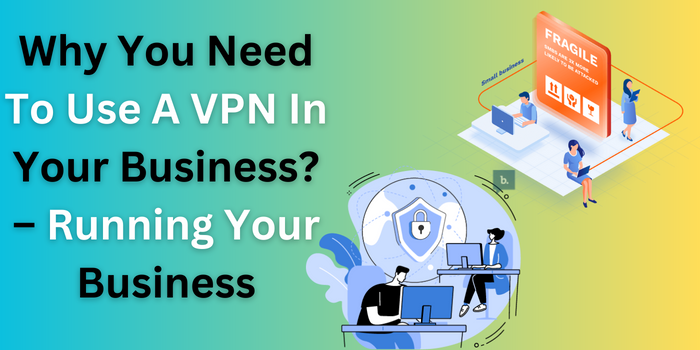
Why You Need To Use A VPN In Your Business? – Running Your Business
Enhance security and efficiency in running your business by utilizing a VPN. Learn why you need to use a VPN in your business for safer data transmission and seamless operations. Protect sensitive information today.
Securely run your business with the utmost privacy and efficiency by leveraging a VPN. Using a VPN in your business safeguards sensitive data, ensuring safe transmission and protecting against cyber threats.
Additionally, with a VPN, you can access geo-restricted platforms like Hulu in Philippines, expanding your entertainment options while maintaining your company’s online security.
Stay ahead in the competitive market and enjoy seamless operations with the invaluable advantages of incorporating a VPN in your business infrastructure.
What Are The Benefits Of Using A VPN In My Business?
Using a VPN in your business can yield numerous advantages, enhancing security and productivity while running your business. Some key benefits include:
- Enhanced Data Security:A VPN encrypts your business’s online communications, safeguarding sensitive data from potential breaches and cyberattacks.
- Protected Remote Access:Employees can securely access company resources and files from anywhere, ensuring seamless remote work capabilities.
- Privacy and Anonymity: A VPN masks your business’s IP address, maintaining online anonymity and protecting against tracking and data profiling.
- Geo-restricted Content Access: With a VPN, your business can bypass location-based restrictions, accessing global tools, services, and content.
- Safe Public Wi-Fi Usage: VPNs shield your business from threats on public Wi-Fi, preventing unauthorized access to your sensitive information.
- Prevention of Data Throttling:VPNs can circumvent ISP throttling, ensuring smooth data flow and uninterrupted business operations.
- Compliance with Regulations:Utilizing a VPN helps your business meet data protection and privacy regulations, avoiding potential legal issues.
- Secured File Sharing: VPNs enable secure file transfers within your business network, protecting valuable intellectual property.
- Network Resource Optimization:A VPN can balance network loads and prioritize critical applications, improving overall performance.
- Protection Against DDoS Attacks:VPNs can act as a buffer against Distributed Denial of Service (DDoS) attacks, maintaining business continuity.
- Collaboration and Connectivity:VPNs foster seamless communication and collaboration among geographically dispersed teams.
- Business Expansion Flexibility:With a VPN, your business can establish a virtual presence in various locations without physical infrastructure.
- Cost-Effectiveness:Implementing a VPN can reduce the need for dedicated network hardware, saving costs in the long run.
- Secure Cloud Access:A VPN ensures encrypted connections to cloud services, safeguarding sensitive data stored in the cloud.
- Real-time Threat Protection:Some VPNs offer built-in security features like malware scanning and intrusion detection, bolstering your business’s defense.
Incorporating a VPN into your business infrastructure empowers you to proactively address cybersecurity concerns, facilitating efficient and secure operations across the organization.
How Does Using A VPN Enhance My Business’s Security?
Using a VPN in your business significantly enhances security, safeguarding sensitive data and fortifying your business’s overall defense.
Here’s how a VPN for business can bolster security:
- Data Encryption:Encrypts data transmitted between devices, making it indecipherable to unauthorized entities.
- Secure Remote Access:Allows employees to securely access company resources from remote locations through encrypted tunnels.
- Protection on Public Wi-Fi: Shields businesses from potential threats on public Wi-Fi networks.
- Anonymity and Privacy:Masks business’s IP address, ensuring online anonymity.
- Bypassing Geo-restrictions:Enables access to geo-restricted tools, services, and content without compromising security.
- Mitigating Cyber Attacks:Acts as a barrier against potential cyber threats.
- DDoS Protection:Some VPNs offer protection against Distributed Denial of Service (DDoS) attacks.
- Secure Cloud Connectivity:Ensures encrypted connections to cloud services, safeguarding data.
- Compliance with Regulations: Helps your business comply with data protection and privacy regulations.
- Securing VoIP Communication:Encrypts Voice over Internet Protocol (VoIP) calls, enhancing communication security.
Using a VPN for business strengthens security and ensures safe operations in an increasingly connected digital landscape.
Can A VPN Help Protect My Business’s Sensitive Data?
Yes, using a VPN in your business can significantly help protect sensitive data. A VPN for business employs encryption to secure data transmitted between devices, making it unreadable to unauthorized parties.
This ensures that sensitive information, such as financial data, customer records, and intellectual property, remains confidential and protected from potential cyber threats.
By establishing secure connections and encrypted tunnels, a VPN safeguards your business’s sensitive data, providing an essential layer of defense against data breaches and unauthorized access.
Embracing a VPN for business is crucial in maintaining the confidentiality and integrity of your valuable information while running your business.
Will Using A VPN Improve My Business’s Online Privacy?
Absolutely, using a VPN in your business can significantly improve online privacy. A VPN for business masks your business’s IP address, adding an extra layer of anonymity to your online activities.
This prevents websites, advertisers, and potential cyber attackers from tracking your business’s online behavior and gathering personal information.
With encrypted connections and secure tunnels, a VPN ensures that all data transmitted remains confidential, safeguarding sensitive information from prying eyes.
Incorporating a VPN for business allows you to elevate your online privacy and safeguard your business’s digital footprint amid our increasingly interconnected world.
Whether troubleshooting issues like Hulu not working on Firestick, a VPN shields your online activities, ensuring confidentiality and anonymity. Embracing a VPN fortifies your business’s security, protecting sensitive data from potential threats and offering a safer environment for running your business.
With encrypted connections and secure tunnels, a VPN enables your business to navigate the digital landscape confidently and securely, preserving its integrity and privacy.
Is It Legal To Use A VPN For Business Purposes?
Yes, using a VPN in your business purposes is generally legal in most jurisdictions. VPNs are legitimate tools that enhance security and privacy for businesses.
However, it is essential to ensure that you comply with the laws and regulations of the country or region where your business operates. Some countries may have specific restrictions or regulations regarding VPN usage.
If you are experiencing issues like Hulu not loading on TV, it is wise to consider the legal aspects and seek appropriate legal counsel before implementing a VPN for business. Ensuring compliance with relevant laws is essential.
Abiding by the applicable regulations enables you to harness the full potential of a VPN for business, making it a valuable asset in running your business securely and efficiently.
By addressing any legal concerns and following the appropriate guidelines, you can optimize the benefits of using a VPN while troubleshooting problems like Hulu not loading on TV for smoother business operations.
Are There Any Risks Associated With Using A VPN In My Business?
While using a VPN in your business offers numerous benefits, there are some potential risks to be aware of:
- Data Privacy Concerns:Selecting an unreliable VPN service may lead to data logging or leaks, compromising your business’s privacy.
- Connection Drops:A VPN can disconnect unexpectedly, potentially exposing your business’s data during these lapses.
- Slower Internet Speed:Encryption may slightly slow down internet speed, affecting certain business operations.
- Compatibility Issues:Some applications or services might not work seamlessly with certain VPN configurations.
- VPN Service Reliability:Relying on an unreliable VPN provider can lead to downtime and interrupted operations.
- Security Vulnerabilities:If not properly configured, VPNs can have security loopholes that hackers could exploit.
- Legal and Compliance Risks:Depending on the region, VPN usage might conflict with data protection and regulatory requirements.
- User Awareness:Employees must be educated about proper VPN usage to prevent potential security breaches.
- Single Point of Failure:In the event of a VPN server failure, business operations relying on it could be disrupted.
- Malware Distribution: Some free or unverified VPN services might expose your business to potential malware threats.
To mitigate these risks, it’s essential to choose a reputable VPN provider, regularly update VPN software, and enforce proper security protocols within your business.
Conducting a risk assessment and implementing best practices will help ensure a secure and efficient VPN for business use while running your business.
Will A VPN Protect My Business From Hacking Attempts?
Using a VPN in your business can be an effective measure to protect it from hacking attempts. A VPN for business encrypts data transmitted between devices, making it extremely difficult for hackers to intercept and decipher sensitive information.
By securing internet connections and masking your business’s IP address, a VPN adds an extra layer of defense, deterring potential hackers from identifying and targeting your business’s network.
While a VPN is a valuable tool, it should be complemented with other security measures such as robust firewalls, regular software updates, and employee cybersecurity training to provide comprehensive protection against hacking attempts while running your business.



